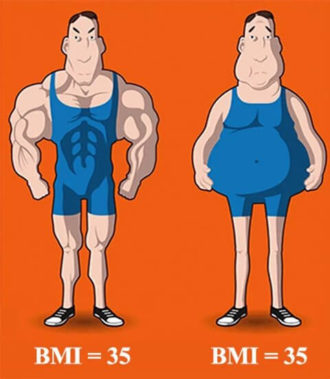
(Image taken from https://healthtechcoach.com)
Having my weight measured is humiliating for me, and I know I am not the only one to feel this way. My weight has been the source of mocking from childhood. More recently it has been the reason for judgment and snide remarks from some medical practitioners.
In the pre-op before my last colonoscopy, I suffered through the humiliating experience again, only to be told that my BMI indicated I was obese. Putting this in context, I had lost over 100kg, changed my lifestyle and diet, and had surgery to remove over 10kg of fat and I was still obese! At the time, the nurse tried to soften the blow by saying they operated on people with a higher BMI than mine, but this was no comfort for me.
The BMI has been used as a measure of our health for over 100 years. But where did it come from and is it accurate?
In the 1830s Belgian mathematician, statistician, sociologist, and astronomer Lambert Adolphe Jacques Quetelet created the BMI. He was not a medical doctor or scientist. Back then, there were no computers, so a simple calculation was devised. The calculation for the BMI is our weight measured in kilograms divided by our height measured in metres squared.
In short, the BMI says that those of us who are overweight or obese are unhealthy, and those of normal weight are healthy. But science has disproven this. Studies have found that the measurement is not accurate. Short people have a lower BMI than they should, and tall people have a higher BMI.
The BMI does not distinguish fat from muscle, and muscle weighs around 18% more than fat. This means that when we exercise and develop muscle mass, we will weigh heavier than if we were to store the same amount of fat. So, an athlete with well developed muscles will have a higher BMI than someone of the same height who does not exercise and has body fat.
The BMI does not take into consideration where our fat is stored. Fat stored on our hips has a lesser impact on our health than fat stored on our abdomen. It does not calculate healthy weight for different demographics as it was based on data from white Europeans.
A healthy weight is hard to calculate. But studies have shown that fat in our abdomen, known as visceral fat, is associated with an increased risk of heart disease and other metabolic issues. The problem with visceral fat is that it is an active tissue which develops unhealthy substances that are toxic to our bodies.
Other factors which impact weight are our general health, height, muscle-fat-ratio, bone density, body type, sex and age.
The next time you are told your BMI is high and you are unhealthy, remember that determining your health condition is not that simple. My advice is to concentrate on making lifestyle changes to improve your health rather than worrying about your BMI.
In love, Jenny.
(Information taken from www.medicalnewstoday.com)